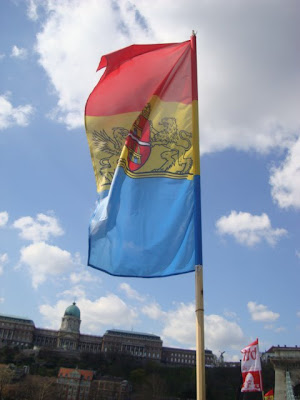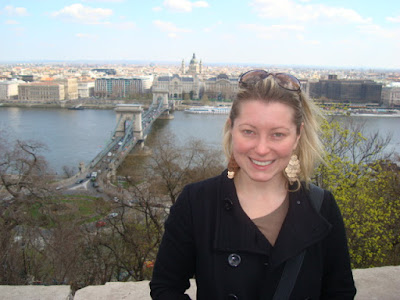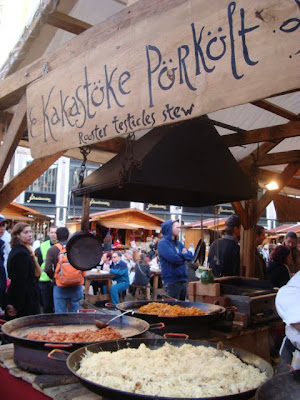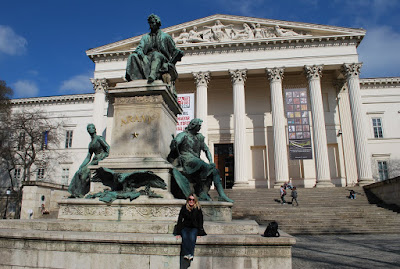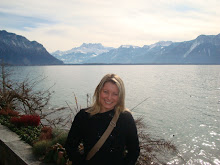The funniest example of the passion the Swiss have for their watches was in the Geneva airport at baggage claim. Everywhere you looked, every time you turned around, there was a new watch advertisement bearing down on you, eschewing you to spend thousands of dollars on a timepiece that admirably keeps the time but also gives you that air of sophistication that can only be found in Swiss craftmanship.
Saturday, April 24, 2010
The Art of Watch-Making in Switzerland
The funniest example of the passion the Swiss have for their watches was in the Geneva airport at baggage claim. Everywhere you looked, every time you turned around, there was a new watch advertisement bearing down on you, eschewing you to spend thousands of dollars on a timepiece that admirably keeps the time but also gives you that air of sophistication that can only be found in Swiss craftmanship.
Friday, April 23, 2010
Exploring Geneva
We walked around for a bit, found a gorgeous outdoor cafe at which to eat lunch, then walked around the old town and along the edge of the lake. The Jet d'eau, the fountain that defines Geneva, was very impressive up close, and I was glad my friend had talked me into seeing it.
These birds had no shame.
The Jet d'eau
Friday, April 16, 2010
Should Turkey Join the EU?
Each class starts off with an ungraded 25 question quiz on historical events in a country, region, or political body (so far we've had the United States, the European Union, China, and Sub-Saharan Africa) to test our knowledge of world history and world events, and then as we go through the answers we discuss the implications of those events. For example, some questions recenty were "Who initiated what came to be known as the Reformation and when?" (Answer: Martin Luther, 1500s), "The foundations of the European Community were laid by creating a common market in two key industry sectors. What were they?" (Answer: coal and steel), and "The EU recently lost a 16-year-old dispute with Latin American countries over which product?" (Answer: bananas). Embarrassingly, I did much better on the quiz about the EU than on the quiz about the US.
During the second half of class one day we discussed whether Turkey should join the EU. One point of view said that Turkey's population is growing so rapidly that if they do join they would soon become the country with the largest population and therefore the most votes, but also the most unpredictable and potentially unstable. A second argument stated that countries like Germany would see massive immigration of Turkish citizens that might tax the social system beyond its means. A third argument said that it's a political issue, because most European politicians would have trouble getting re-elected on a pro-Turkey platform.
The other side of the argument pointed out that Turkey has a lot to offer in economic power, but especially in the youth of the country. The population in the EU is aging rapidly, and birth rates are not keeping up with this aging, meaning the EU will lose 100 million people in the next 50 years. By contrast, 40% of Turkey's population is under the age of 25, which means strong future purchasing power. The two Turkish members of our class gave their personal opinions, both in favor of joining, broken only by an emotionally charged voice from Greece retaliating with an argument that the recent coup d'etat attempt by the Turkish military should count against their stability and therefore their candidacy. Turkey and Greece have a notoriously crisp relationship, and I was shocked to see it manifest itself so forcefully in the class discussion.
The class ended with a slight buzz of tension, but I found it exciting and stimulating to hear discussions on these controversial issues from the people it directly affects.
Tuesday, April 6, 2010
Budapest
On the Thursday afternoon after the last exam, as I began packing for Easter break, I realized that it was the first time I had needed to pack a bag since I arrived in Lausanne nearly 3 months ago. I couldn't believe I really not been out of the city overnight even once. I came from a life where I traveled somewhere nearly every other weekend, so having stayed three months anywhere seemed incomprehensible to me.
My flight left Geneva early on Friday morning for the short one and half hour direct flight to Budapest. The country is part of the Schengen zone, is in the EU but is not on the euro, so I had the fun of getting used to a new currency, the forint, and trying to figure out exactly how much a 10,000 forint bill was worth (answer = about $51).
My first impression when I traveled from the airport to the city center was that it was old-world Europe, run down, war-torn, and reminiscent of what I picture about Russia in the 1950s. Luckily, that was just the outskirts. The city center was bright, clean, picturesque, but still quaint. The forecast had called for intermittent rain, but I managed to get really lucky with the weather, with warm temperatures, blue sky, and no precipitation. During Friday, Saturday, and Sunday I walked all over the city, seeing all the famous sites, and my stomach cooperated nicely after I gently eased back into real food. (I even got to try some Hungarian sausage.) I went to Heroes Square, to the Castle District, to the National Museum, to a traditional Hungarian music and dance concert, to lots of wonderful outdoor fairs, on a dinner cruise on the Danube, and to the famous thermal baths, twice. It was a great city for a weekend vacation, and I managed to thoroughly and fully relax for the first time since school started. However, my hotel was located next to the zoo, so I was awakened each morning to the alarming cries of a male peacock stating his territory, and put to bed each night by the deep grunts of a lion.
I noticed especially that the city was all about artists. Every corner had a street musician playing for money, often young high-school age students, but sometimes older men and women. Every poster and billboard on the streets seemed to advertise a concert, a play, the opera, or a new art exhibition opening soon. There were many art exhibitions spread outdoors around the city as well.
On our descent into Geneva during the return trip home Monday morning we cruised down to landing speed and seemed ready for a textbook finish before the pilot suddently gunned the engines and pulled the nose high into an ascent. The passengers looked around at each other in concern as the pilot informed us hurriedly that we were aborting the landing, that it was a completely normal procedure, and that he would tell us more as soon as he knew more. After a few seemingly endless minutes, as we climbed higher and higher and flew farther and father away, the pilot came back on to tell us that the runway had been blocked by another plane, from Iberia Airlines, so we had aborted the landing so as not to crash into it. (Seemed reasonable to me). Luckily, since Geneva is a relatively small airport, we were cleared to land about 15 minutes later without incident.
Subway
Forint.
Heroes Square
Heroes Square.
Heroes Square.
I'm everywhere. (and tasty!)
This is a new series titled "Rosemary doing handstands in front of famous stuff."
Reflection.
Didn't try this one.
National Museum.
Hungarian goulash!
Hungarian sausage.
Art exhibit.
Parliament.
Metro stop that is close to my name.
Hungarian dancing.
I can play the clarinet!
Looking death in the face.
Thermal bath.
Subscribe to:
Posts (Atom)
































